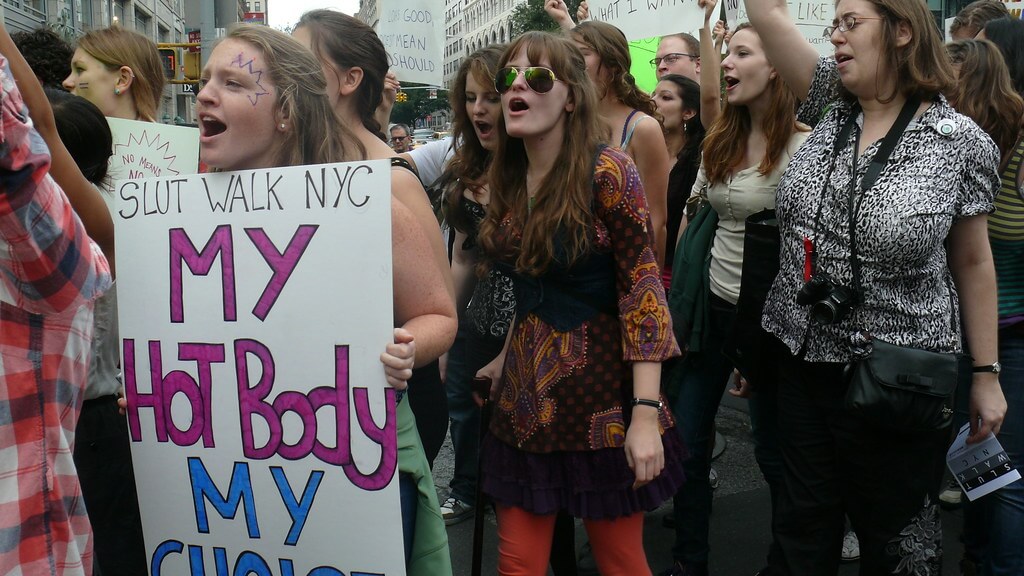Despite the spread of patriarchal, neoconservative politics in Central Europe, the last years have also brought a growing awareness of women’s rights in the region. Green European Journal spoke with Réka Kinga Papp, editor-in-chief of Eurozine, about issues of gender in Hungary under Prime Minister Viktor Orbán’s illiberal regime, the impact of #MeToo in the country, and putting feminist questions on the agenda.
GEJ: Tell us about the impact of the #MeToo movement in Hungary.
Réka Kinga Papp: In the past, women’s issues were almost completely absent from Hungarian public life. When I started writing about women’s issues a decade ago, I was faced with a very closed-minded, distrustful community. The turn of events came about in part due to the activities of our illiberal government [for more on illiberal democracy in the country, see our Hungary focus], and due to domestic violence scandals of recent years – for example the so-called ‘blind sheepdog’ case.[1] These have increased the public’s perception of the issue and created a new narrative in society: that women shouldn’t remain silent about oppression, but instead stand up and come forward with their cases. But on level of policy and executive structures, the situation remains dire.
#MeToo has arrived in this context: the biggest scandal erupted when the dealings of the renowned theatre director László Marton came to light. Over the years, he has sexually assaulted a number of actresses, and now many of them decided to share their stories. The #MeToo scandals led to the dismissals of a number of prominent personalities in the world of theatre and media. But the punishment was only temporary: László Marton is making a comeback as director, and many journalists who see themselves as progressive and liberal have pushed for a narrative that partly blames those who came forward.
Can it then be said that #MeToo has shown us the intolerant side of progressive intellectuals as well?
I would rather say that the discourse has shed light on an intolerant attitude that wasn’t unknown to women who work in the media. It became much more obvious how some people think about others, and this gave additional legitimacy to the acts of those who oppose sexist behaviour. Young people today are much more willing to stand up against sexism, and they dare to think that they deserve better treatment. This is definitely a change for the better.

What are the origins of the ruling Fidesz government’s anti-gender campaigns?
I don’t necessarily think that it is coming from the neoconservative identity of Viktor Orbán. Rather, I would say that the attacks on gender studies provide for a perfect strawman – meaning that the government’s distorted argument and deceptive reasoning can easily lead to some political success, without the majority of people spotting the flaws.
Hungary is in a unique position – even when compared to the rest of the former socialist countries – because there was an idea of a dual morality during socialist years which meant that people had to stay silent on political issues, and in exchange their private lives were respected by those in power. This had a unique rebound effect: in Hungary, women’s issues remained underdeveloped, as on the political level the Soviet experiment proclaimed universal equality in these countries, and that no one should dare to claim otherwise, while household issues, family life, and domestic violence were seen as private. Not even women wanted to deal with women’s issues, since it would have been perceived as interference with the privacy of the home. So talking about the societal roles of women was not taken well by Hungarian society.
Since the years of the post-1989 transitions, the situation has deteriorated even further. For example, there used to be relatively many female roles in theatre, television, or movies which were available to at least a few privileged actresses, but almost all of these have disappeared with the commercialisation of the media landscape.
Are other politicians of the region influenced by the patriarchal politics of the Hungarian government?
Evidently, we are witnessing similar trends in the region. The most apparent example is that of the current Polish government, which won elections by promising to bring Budapest to Warsaw – and by now, we see a number of similarities in issues like family policy between the two countries.
Orbán is part of a larger neoconservative movement and kind of a forerunner of the current backlash on human rights
Of course, I am not saying that Polish conservatives are turning to Orbán for advice – I would rather say that Orbán is part of a larger neoconservative movement and kind of a forerunner of the current backlash on human rights [for more on feminist issues and the backlash, see our gender in focus]. When it comes to attacks on civil society organisations or the demonisation of George Soros [see here for more on attacks on civil society in Hungary], we can see very similar behaviours in multiple countries of the region. I see this as an adoption of Putin’s politics – Orbán has been copying the Russian leadership for years already, while the others are just starting [see here for more on Russia’s links to Hungary and other EU countries].

In Hungary, there were also rumours that #MeToo was just an alibi for the punishment of certain individuals, and that the actual reasons were political.
One of the cases concerned a well-known journalist whose performance in the last couple years has been quite questionable: I suspect it wouldn’t have been difficult to find serious cases of sexism and misuse of power in his work or personal relationships. But the cases that have led to his dismissal, the timing of the scandal, and the way the pro-government media presented the issues has shown that this was more of a political vendetta and less of a grassroots initiative.
But what we saw in the case of Marton was completely different: the actress Lilla Sárosdi risked everything by being the first to come forward with testimony of how the famous director abused his powers. Sárosdi was harshly attacked afterwards; her coming forward was not a well-thought-out strategy, but an honest effort to bring down a predator. The Marton-case was based on true and wide-spread outrage in our society, while his rather mild punishment could be attributed to a dominant mindset in public life which excuses the misbehaviours of talented (whatever we mean by talent) white men for the sake of their art.
You said earlier that the situation remains dire on the policy level. What do you mean by that?
There is wide-spread criticism that there are almost no women in the Orbán government – but this is only the tip of the iceberg. The public discussion and the political discourse are openly oppressive and sexist – but again this is just a small part of the whole picture. Immediately after Orbán won the 2010 election, family support policies were converted into tax benefits which always favour those with a higher income. All the current social policies and family benefits have been tailor-made for the upper-middle class and the wealthy. And now that the government has cut the financing of vital public services, such as public education, these family support measures will enable the upper class to buy themselves out of the ill-functioning public system, and pay for private schools and healthcare instead. The less fortunate will not have the same chances.
Furthermore, the government has modified the Hungarian Constitution and paved the way for a possible ban on abortion. Aside from all this, members of the governing party are trying to reframe the issue of women in the workforce by emphasising that women can (and probably should) achieve their personal fulfilment by giving birth – which again shows the infinite foolishness of these people because their statement implies that the majority of women work tirelessly for long hours and minimal pay due to a longing for personal fulfilment or self-realisation. Wanting to have a career beside raising children is a totally legitimate desire, and I don’t think that anyone has the right to question the legitimacy of women doing useful work. But in practice we often see the livelihoods of families depend on the mother working, even if her job doesn’t pay well.
Could the newly introduced family policies have the government’s desired outcome: an increased fertility rate?
What we see in other parts of the world is that these types of family planning policies never have any long-term benefits. They only support a small proportion of the society, and exclude those who really would want to start a family if only they could afford it. For exactly this reason the policy is doomed to failure.
Is there anything that the government is doing right? The historian Andrea Pető has pointed out that at very least the growing number of nursery places is a step in the right direction.
I think she’s right about this. But we always have to add that it is still far from what is really needed. The number of nursery places have been increased earlier only by raising the maximum number of children allowed in a class – so there was no change in actual capacities. This is a realistic scenario for this case as well. Now, if we want to talk about actual positive changes, we could mention that the government changed the divorce procedure: there is no more mandatory conciliation, and the process has become more administrative. But at the same time, the conditions in public hospitals are deteriorating, and by now giving birth in an acceptable environment is only possible in private institutions. Public education is also incredibly underfunded, and all the support services have been torn apart. Everything required for safely raising a child in such a depressing social state has by now been disbanded.

Are the positive changes you mentioned just errors in the system or issues that are unimportant in the government’s strategy?
It can be seen in other areas – such as when it comes to people with disabilities or other neglected topics – that, from time to time, progressive initiatives make it into actual policy. I can’t tell you how the reform of childcare benefits or the regulation of divorces happened because I have no information on the actual process, but it is clear that the government made a conscious decision not to communicate these changes to the wider public. from time to time, progressive initiatives make it into actual policy
You mentioned the possibility of a ban on abortion. A couple of years ago the government also tightened the regulation on vasectomies. Might we witness additional attacks on access to birth control and abortion?
This government has cancelled the authorisation of abortion pills, meaning that anyone who wants to end her pregnancy has to take the additional health risk of a very harsh, expensive, and invasive intervention – instead of just taking two pills. It is true that the pills themselves can also account for a very shocking experience and are heavy on the health – but not to the same extent as the alternative.
We need to take the housing crisis more seriously, since there is a surge in the price of rent all over Europe and it has serious consequences on women’s emancipation
Besides this, despite of the recommendations of the EU and the WHO, morning-after pills still require medical prescriptions, and the government keeps their price relatively high. Even during Fidesz’s first term, the party’s politicians argued that they are unwilling to support the so-called ‘irresponsible sexual life of young people’, even though we know that tightening access to contraception mostly endangers vulnerable age groups. I don’t know what the Orbán government thinks of teenage pregnancies, but I’m not really a fan. It is apparent that the government does not support any form of contraception, and the remains of sexual education are slowly fading away.
What topics would you highlight when it comes to putting issues of gender and feminism on the political agenda in Hungary or other member states?
First of all, we need to take the housing crisis more seriously, since there is a surge in the price of rent all over Europe and it has serious consequences on women’s emancipation, on raising children, and on almost any other social issue – from the access to education to women’s independence – as women who can afford an apartment are less likely to get stuck in abusive relationships.
What could progressive parties in the EU do in order to change something for the better in Hungary?
I would like to see the European Union take its own human rights provisions more seriously, instead of looking at Europe only as an economic community. The entire EU institutional system would require some sort of reform; it is unacceptable that the Orbán regime is being financed by EU funds, corruption cases don’t have any consequences, and that meanwhile neither grants nor the courts are available for those who genuinely need them. If the EU could reform its institutions in a meaningful way, that would surely have a positive impact on the countries that joined the EU in the last decades. But this arrogant, top-down lecturing of member states – which we have already seen in the case of Greece and which also comes up in the discourse about Orbán – surely won’t help.
[1] In this case, a Fidesz MP beat up his domestic partner and, when questioned by the media, claimed that he had not caused the women’s injuries but that she had fallen over the family’s blind sheepdog.
*This interview was first publish in Green European Journal. It has been published here with permission.
![Political Critique [DISCONTINUED]](https://politicalcritique.org/wp-content/uploads/2015/09/Political-Critique-LOGO.png)
![Political Critique [DISCONTINUED]](https://politicalcritique.org/wp-content/uploads/2015/09/Political-Critique-LOGO-2.png)